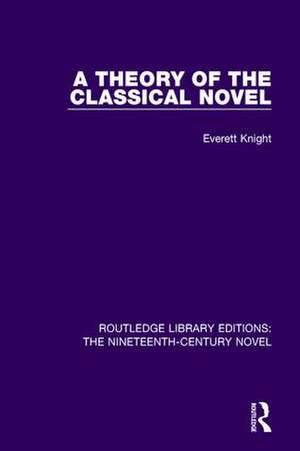A Theory of the Classical Novel: Routledge Library Editions: The Nineteenth-Century Novel
Autor Everett Knighten Limba Engleză Hardback – 19 iul 2016
| Toate formatele și edițiile | Preț | Express |
|---|---|---|
| Paperback (1) | 236.54 lei 43-57 zile | |
| Taylor & Francis – 12 dec 2017 | 236.54 lei 43-57 zile | |
| Hardback (1) | 625.03 lei 43-57 zile | |
| Taylor & Francis – 19 iul 2016 | 625.03 lei 43-57 zile |
Din seria Routledge Library Editions: The Nineteenth-Century Novel
- 34%
 Preț: 764.20 lei
Preț: 764.20 lei - 17%
 Preț: 237.93 lei
Preț: 237.93 lei - 34%
 Preț: 847.73 lei
Preț: 847.73 lei - 34%
 Preț: 496.94 lei
Preț: 496.94 lei - 54%
 Preț: 515.00 lei
Preț: 515.00 lei - 34%
 Preț: 764.20 lei
Preț: 764.20 lei -
 Preț: 351.66 lei
Preț: 351.66 lei - 34%
 Preț: 680.73 lei
Preț: 680.73 lei - 17%
 Preț: 237.93 lei
Preț: 237.93 lei - 34%
 Preț: 680.73 lei
Preț: 680.73 lei - 34%
 Preț: 764.20 lei
Preț: 764.20 lei - 34%
 Preț: 823.17 lei
Preț: 823.17 lei - 52%
 Preț: 473.94 lei
Preț: 473.94 lei -
 Preț: 343.00 lei
Preț: 343.00 lei - 34%
 Preț: 764.20 lei
Preț: 764.20 lei - 34%
 Preț: 625.03 lei
Preț: 625.03 lei -
 Preț: 351.66 lei
Preț: 351.66 lei - 49%
 Preț: 541.50 lei
Preț: 541.50 lei - 34%
 Preț: 819.90 lei
Preț: 819.90 lei - 16%
 Preț: 241.15 lei
Preț: 241.15 lei - 34%
 Preț: 485.78 lei
Preț: 485.78 lei - 34%
 Preț: 764.20 lei
Preț: 764.20 lei - 34%
 Preț: 625.03 lei
Preț: 625.03 lei - 34%
 Preț: 680.73 lei
Preț: 680.73 lei - 34%
 Preț: 764.20 lei
Preț: 764.20 lei - 34%
 Preț: 764.20 lei
Preț: 764.20 lei -
 Preț: 353.57 lei
Preț: 353.57 lei - 54%
 Preț: 513.61 lei
Preț: 513.61 lei - 34%
 Preț: 625.03 lei
Preț: 625.03 lei - 52%
 Preț: 473.94 lei
Preț: 473.94 lei - 34%
 Preț: 625.03 lei
Preț: 625.03 lei - 55%
 Preț: 652.84 lei
Preț: 652.84 lei - 34%
 Preț: 764.20 lei
Preț: 764.20 lei - 34%
 Preț: 625.03 lei
Preț: 625.03 lei - 17%
 Preț: 259.07 lei
Preț: 259.07 lei - 34%
 Preț: 847.73 lei
Preț: 847.73 lei - 34%
 Preț: 15600.30 lei
Preț: 15600.30 lei - 34%
 Preț: 625.03 lei
Preț: 625.03 lei - 34%
 Preț: 765.01 lei
Preț: 765.01 lei - 34%
 Preț: 847.73 lei
Preț: 847.73 lei - 34%
 Preț: 625.03 lei
Preț: 625.03 lei
Preț: 625.03 lei
Preț vechi: 942.63 lei
-34% Nou
Puncte Express: 938
Preț estimativ în valută:
119.60€ • 125.19$ • 99.54£
119.60€ • 125.19$ • 99.54£
Carte tipărită la comandă
Livrare economică 31 martie-14 aprilie
Preluare comenzi: 021 569.72.76
Specificații
ISBN-13: 9781138671102
ISBN-10: 113867110X
Pagini: 166
Dimensiuni: 156 x 234 mm
Greutate: 0.45 kg
Ediția:1
Editura: Taylor & Francis
Colecția Routledge
Seria Routledge Library Editions: The Nineteenth-Century Novel
Locul publicării:Oxford, United Kingdom
ISBN-10: 113867110X
Pagini: 166
Dimensiuni: 156 x 234 mm
Greutate: 0.45 kg
Ediția:1
Editura: Taylor & Francis
Colecția Routledge
Seria Routledge Library Editions: The Nineteenth-Century Novel
Locul publicării:Oxford, United Kingdom
Cuprins
1 Some Preliminary Notions 2 further Preliminaries 3 The classical novel as an Art Form 4 Balzac, Flaubert, Zola, Stendhal 5 The Case of Dickens; Conclusion; Index
Descriere
First published in 1969, this book asserts that two concepts, structure and praxis, make it impractical for scholars to ignore the necessity of a theory of the novel — with the term ‘classical novel’ used to cover western fiction. The author argues that the novel is fundamentally an ‘enterprise’ — an aspect of the praxis of a particular social class — and that the ways of orthodox scholarship are also a praxis. The investigator must enquire into the nature of their questions as those traditionally put to literature are inspired by ‘irrelevant’ nineteenth century positivism. In the author’s view the book is necessarily a theory of the classical novel and a manifesto for the student movement.
